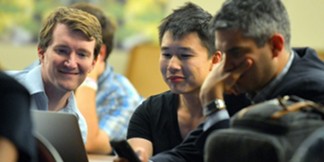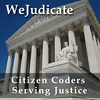Before my current job as their data scientist, I worked as a staff attorney for the Massachusetts Committee for Public Counsel Services (public defenders). For six years prior to law school, I taught high school physics and astronomy, and the choice to leave teaching was probably the most difficult of my professional life. I began my career as a teacher because I felt it was the place where I could best put my skills and interests to work making a difference. Eventually, I entered law school having come to the conclusion that I could do more with the law. Having encountered a number of legal issues as a teacher, entrepreneur, and community volunteer, I came to recognize that the law greatly affected all that I cared for. Because of this, the law, especially public service work, holds a strong attraction.
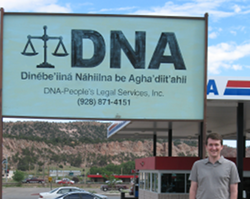 Me standing outside the DNA offices in
Window Rock, the capital of the Navajo Nation.
Me standing outside the DNA offices in
Window Rock, the capital of the Navajo Nation.
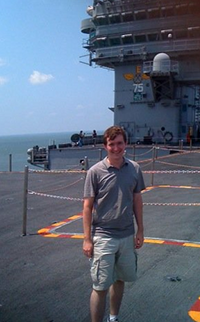
Fun times on the USS Harry S Truman during a tour with the other JAG interns, and yes, I think I'm wearing the same shirt in both this and the DNA picture.
I was an article editor for the BU Journal of Science and Technology Law, and my Note, Heads in the Clouds, A Coming Storm: The Interplay of Cloud Computing, Encryption, and the Fifth Amendment's Protection Against Self-incrimination, was published in volume 17 of the journal.
Before graduating, I participated in BU's Criminal Law Clinic where I worked as a Rule 3:03 attorney providing criminal defense to indigent defendants at the Boston Municipal Court.
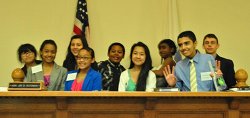 My first class of student attorneys, middle schoolers participating in Discovering Justice's mock trial program.
My first class of student attorneys, middle schoolers participating in Discovering Justice's mock trial program.
When I worked in northern MA, I volunteered as a coach for Discovering Justice's mock trial program. As I'm fond of ponting out, all I did by switching to the law was move from the laws of nature to those of humanity.
Occasionally, I blog about the law and my work under Law & Lawyering on my blog.
As discussed on this site's disclaimer, none of the information found on this website should be considered legal advice nor can I dispense legal advice in person or over email.
Hackathon's aren't just for Silicon Valley. Lawyers, from public defender's to BigLaw, benefit, too.
A collection of materials I find useful to have on hand in court: links, resources re-formated for mobile, and interactive aids I call guesstimators. I'm always looking for new material. So give it a look, and drop me a suggestion.
A Coming Storm
A Note on the interplay of cloud computing, encryption, and the Fifth Amendment's protection against self-incrimination, published in the BU Journal of Science and Technology Law, Volume 17.
Helping provide "justice for all" by building a suite of open source-open API tools for the courts and legal practitioners.
